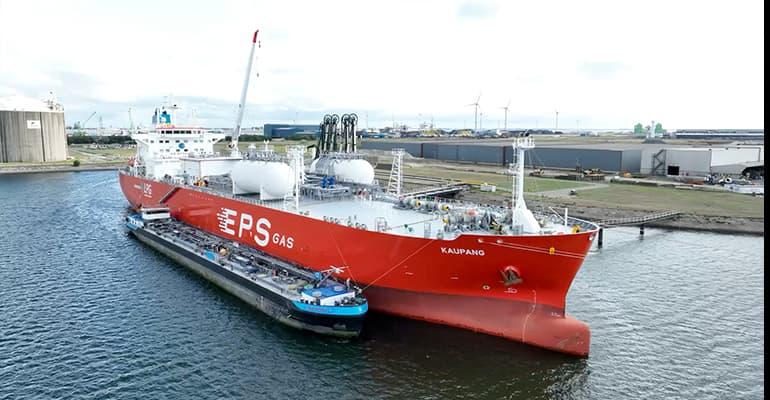Partnering with tonnage provider Eastern Pacific Shipping (EPS), this GCMD-led trial involved the Kaupang, a mid-sized gas carrier equipped with an LPG dual-fuel engine. As opposed to sailing on conventional fuel oil, LPG propulsion can reduce emissions. Using LPG requires a pilot fuel; replacing the pilot fuel with a biofuel blend can further reduceemissions.
In this trial, approximately 200 MT of a B30 biofuel blend of hydrotreated vegetable oil (HVO) and marine gas oil (MGO) provided by GoodFuels was bunkered in the Port of Vlissingen (Flushing) as the pilot fuel for LPG propulsion.
Prior to this trial, GCMD had successfully traced two supply chains of FAME-based biofuels blends with synthetic DNA from production to consumption through Singapore. In this most recent trial, GCMD collaborated with GoodFuels, Control Union and IDS to deploy an element-based tracer in HVO to assure its origination and quantity in the biofuel blend.
Unique to this trial, the tracer was dosed in-line with HVO and blended with MGO onboard the bunker vessel. Carbon dating was conducted in accordance with Standard EN 16640 to independently determine the biogenic carbon content given the chemical similarities between HVO and some of the components in MGO.
VPS witnessed the trial at all stages from biofuel transfer and onboard blending to bunkering aboard the Kaupang. VPS also conducted extensive laboratory tests on aliquots of the biofuel and biofuel blend collected at numerous pre-determined points along the supply chain to assess quality per Standards EN 15940 and ISO 8217.
Aligning with the key outcomes of MEPC 80
MEPC 80 has issued MEPC.1/Circ.905 Interim Guidance on the Use of Biofuels under Regulations 26, 27 and 28 of IMO MARPOL Annex VI (DCS and CII), which will come into effect on 1 October 2023. These interim guidelines will provide clarity on the types of biofuels that can be certified sustainable; these biofuels will also need to meet a minimum requirement of 65% emissions reduction against conventional fuel to be compliant.
Produced from 100% waste and residues, the HVO used in this trial has a well-to-wake emissions of 16 gCO2e/MJ. This translates to a 83% reduction in emissions compared to using fossil MGO, and in blending MGO with 30% biofuel as the pilot fuel for LPG combustion, this trial demonstrated a 20% net reduction in emissions compared to the Kaupang sailing on VLSFO.
The data collected from this trial augments those collected from the prior two supply chain trials for GCMD to further develop its assurance framework for drop-in green fuels. In the context of the recently updated guidelines, this framework should impart greater confidence in fuel purchasers meeting or exceeding IMO regulatory requirements.
On the completion of bunkering of this drop-in biofuel supply chain trial, Dr Sanjay Kuttan, Chief Technology Officer of GCMD, said: “The experiences from this trial will strengthen the development of our framework to provide emissions abatement assurance when it comes to paying a premium for green fuels over fossil fuels. Through this pilot, we demonstrated that different tracing techniques can help ensure authenticity and quantity of sustainable biofuels in the supply chain. And using a biofuel blend with LPG can be a feasible pathway for ships to meet the recently revised IMO indicative decarbonisation checkpoint for 2030.”
Copyright © 2024. All rights reserved. Seatrade, a trading name of Informa Markets (UK) Limited.
Add Seatrade Maritime News to your Google News feed.  |

